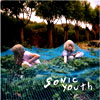
This Week: Superdrag and Sonic Youth let us have it, and various artists contemplate crime and punishment.
Superdrag

Last Call for Vitriol (Arena Rock)
The cover of Superdrag's newest release Last Call for Vitriol is marked with imagery of matches, both unused and entirely burned out. Having made it through a tumultuous few years, Superdrag knows about keeping things fueled. The release opens with the track "Baby Goes to 11," a song whose harmonies are credited to Guided by Voices' Robert Pollard. The track is pure pureed pop complete with lyrics ready for a high school love note. As a band that's always reserved the phrase "yeah yeah yeah" in their bag of optional lyrics, you can rest assured that such predictable rhymes and unobtrusive melodies are all a planned part of the Superdrag package.
Saturated in soaring guitar and overwhelmingly melodic chorus, Superdrag calls us back to attention with little subtleties. A break in the middle of a song, a surprisingly minor 'rewind' sound at the end of a major progression, or the cough concluding track six are all intentionally placed triggers to let us know that Superdrag is exactly that: intentional. A lyric like "I've been so insincere" and that of "Staggering Genius" in which the "genius staggers home" attest to frontman John Davis' awareness both of self and pop music machismo.
While Last Call for Vitriol won't be accused of pushing any sonic envelopes, there are several tracks that exceed your typical Superdrag. Some unexpected results of collaboration, including three tracks between Davis and bassist Sam Powers (coincidentally my three favorite) go full throttle, leaving us brainwashed with what Superdrag does best. Here's the vitriol. In barbershop crooning, alt- country twang, and—I have to say it—Beatlesque melody, these three tracks prove that the Superdrag understanding of song is anything but average. As someone who has always wondered what all the fuss was about, I'll tell you—the melody goes straight to your head.
—Liz Tapp
Sonic Youth

Murray St. (Geffen)
After 20 years, New York-based Sonic Youth continues to amaze with its ability to keep fans on their toes. Some recent albums suggested that the band was losing its touch. Washing Machine from 1995 produced only a few notable songs. Indeed, fans had been spoiled by the incredible, intoxicating cohesiveness of 1988's essential Daydream Nation. But with Murray St., Sonic Youth comes as close to perfection as they have since Nation.
This album demands to be listened to straight through. It functions as a unit. One of the few things that kept me aware that the songs are separate entities is the use of three different vocalists, each adding his or her own unique stamp. The differences between Thurston Moore's and Lee Ranaldo's voices are subtle, but Kim Gordon's voice shocks the listener the first time it appears. In "Plastic Sun" her intense, defiant vocals make the song a standout. If forced to choose another "favorite" song on this album, I would have to go with Lee Ranaldo's contemplative "Karen Revisited."
Although the album has only seven tracks, it is not short. Each song takes its time, with extended instrumental periods that are refreshingly multi-layered; they don't put you in the same non-blinking trance that much of 2000's NYC Ghosts and Flowers did.
Sonic Youth has never produced the gold and platinum records that most of its DGC Records counterparts have. But that is because they have consistently refused to give up all the things that make them Sonic Youth in favor of a more radio-friendly formula. After listening to their newest album, I think they could go on like that forever.
—Veronica France
The Pine Valley Cosmonauts

The Executioner's Last Songs (Bloodshot)
Aside from race relations and abortion, the death penalty may be the most divisive of all issues facing this country.
So you might expect a CD to raise money for the anti-death penalty cause in Illinois (where 17 death row inmates were recently exonerated on DNA evidence) to be filled with polemics sure to fire up angry liberals and piss off the law-and-order types.
Fortunately, Jon Langford—the Mekons leader who put this CD together—is less interested in preaching at us than he is in creating great music. He knows that whatever your take on the death penalty, everybody loves a good murder ballad. And that's mostly what he and assorted guest artists from the indie and alt-country world give us on The Executioner's Last Songs.
From a cover of "Knoxville Girl" by the Handsome Family's Brett Spark to Paul Burch's cover of Bill Monroe's "Walls of Time," most of the songs here are traditional ballads or classic country tunes—all of the guest singers backed by Langford's makeshift Cosmonauts band. Diane Izzo does a haunting version of "Oh, Death" (although Ralph Stanley's is still definitive); Rosie Flores tackles Hank Williams' "I'll Never Get Out of This World Alive"; and Steve Earle throws down an angry "Tom Dooley."
The only thing sermonesque on the disc is "Idiot Whistle," delivered by Tony Fitzpatrick. The rest of these artists seem to be singing about the cruelty of their own death sentence—for we all must face the hangman one day.
—Joe Tarr

July 18, 2002 * Vol. 12, No. 29
© 2002 Metro Pulse
|